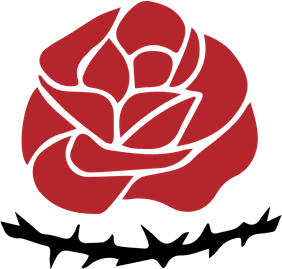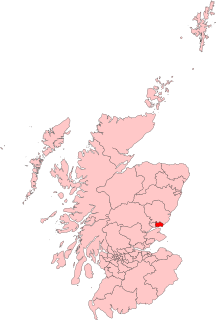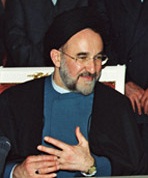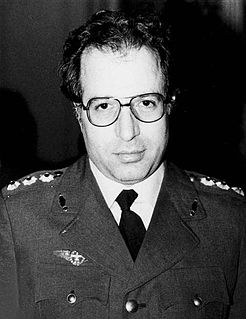
The Tudeh Party of Iran is an Iranian communist party. Formed in 1941, with Soleiman Mohsen Eskandari as its head, it had considerable influence in its early years and played an important role during Mohammad Mosaddegh's campaign to nationalize the Anglo-Persian Oil Company and his term as prime minister. The crackdown that followed the 1953 coup against Mosaddegh is said to have "destroyed" the party, although a remnant persisted. The party still exists, but has remained much weaker as a result of its banning in Iran and mass arrests by the Islamic Republic in 1982, as well as the executions of political prisoners in 1988.

Dundee East is a constituency of the House of Commons of the Parliament of the United Kingdom. Created for the 1950 general election, it elects one Member of Parliament (MP) by the first-past-the-post voting system.

Iranian presidential election of 1997 took place on 23 May 1997, which resulted in an unpredicted win for the reformist candidate Mohammad Khatami. The election was notable not only for the lopsided majority of the winner - 70% - but for the high turnout. 80% of those eligible to vote did so, compared to 50% in the previous presidential election.

The Iranian presidential election of 1985 took place on August 16, 1985, and resulted in the re-election of the incumbent President Ali Khamenei.

The Organization of Iranian People's Fedai Guerrillas, simply known as Fadaiyan-e-Khalq was a Marxist-Leninist underground guerrilla organization in Iran.
The Directorate of General Security (DGS) also called Internal State Security, مديرية الأمن العام, secret police or some variation thereof was a domestic Iraqi intelligence agency.

A referendum on creating an Islamic Republic was held in Iran on 30 and 31 March 1979.

A referendum was held in Iran on 26 January 1963 by the decree of Mohammad Reza Shah, with an aim to show popular support for him, asking voters to approve or veto the reforms of the White Revolution.
Ham-Mihan was a popular reformist newspaper in Iran (Persia).

Javad Fakouri was a prominent military official and defence minister of Iran.

The Iraqi presidential election of 1995 took place on October 15 of that year. It was the first direct presidential election under the rule of Saddam Hussein, who had seized power through the Revolutionary Command Council in 1979. Taking the form of a referendum with no other candidates, the election involved giving voters paper ballots that said: "Do you approve of President Saddam Hussein being the President of the Republic?" They then used pens to mark "yes" or "no". The next day, Izzat Ibrahim, Hussein's deputy in the ruling Revolutionary Command Council (RCC), announced the incumbent had won 99.96% of some 8.4 million valid votes cast. Officially, 3,052 people voted against him, and turnout was 99.47%. The international community reacted with widespread incredulity to these figures.
Marwan Habash is a Syrian politician and writer. He was a member of the Regional Command of the Baath Party in Syria and Minister of Industry in the government of Salah Jadid. Following a successful coup d'etat against Jadid's leadership in 1970, Habash was imprisoned along with others perceived to be Jadid loyalists. One of the world's longest-held political prisoners, he was released in 1993. He has since become a writer and public analyst.

Moderation and Development Party is a political party in Iran. It is a pragmatic-centrist political party which held its first congress in 2002.

Parliamentary elections were held in Iran on 13 March 1980, with a second round on 9 May. They were the first elections to the Majlis since the overthrow of the Shah, and were contested to a considerable degree on a party basis.
The Imperial Inspectorate Organization was an organization of the Iranian Pahlavi government established in 1959 to handle complaints from the public about government officials and agencies. The organization reported directly to the Shah, and was initially headed by General Hussein Fardust, a childhood friend of the monarch. In its first year of operation, the department "received 52,000 complaints and dismissed 424 officials".
The Council for Coordinating the Reforms Front or the Reformist Front Coordination Council is the umbrella organization, coalition and council of main political groups within the Iranian reform movement. Since 2015, it is overseen by the Reformists' Supreme Council for Policymaking.

Mojahedin of the Islamic Revolution Organization was an umbrella political organization in Iran, founded in 1979 by unification of seven underground Islamist revolutionary paramilitary and civil organizations which previously fought against the Pahlavi monarchy.
Imam's Line is a term equivalent to the party line approved by the "Imam"—Ayatollah Khomeini in the Iranian revolutionary terminology.

Socialism in Iran or Iranian socialism is a political ideology that traces its beginnings to the 20th century and encompasses various political parties in the country. Iran experienced a short Third World Socialism period at the zenith of the Tudeh Party after the abdication of Reza Shah and his replacement by his son, Mohammad Reza Pahlavi. After failing to reach power, this form of third world socialism was replaced by Mosaddegh's populist, non-aligned Iranian nationalism of the National Front party as the main anti-monarchy force in Iran, reaching power (1949–1953), and it remained with that strength even in opposition until the rise of Islamism and the Iranian Revolution. The Tudehs have moved towards basic socialist communism since then.

The second local elections in Iran, and the first to elect the members of provincial and township councils (Anjoman), were held in September 1970. 960 seats for 150 councils were up for election.















